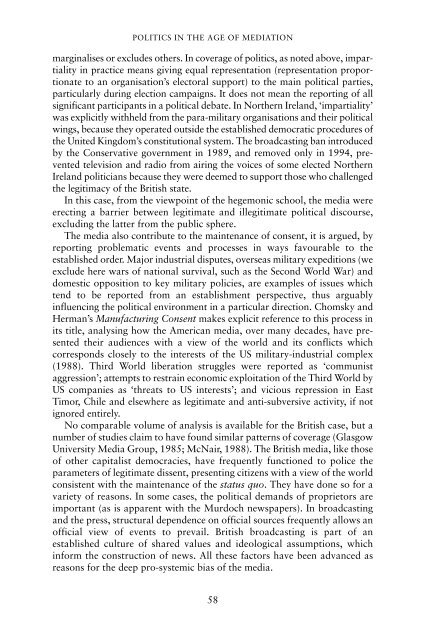20130412164339753295_book_an-introduction-to-political-communication
20130412164339753295_book_an-introduction-to-political-communication
20130412164339753295_book_an-introduction-to-political-communication
Create successful ePaper yourself
Turn your PDF publications into a flip-book with our unique Google optimized e-Paper software.
POLITICS IN THE AGE OF MEDIATION<br />
marginalises or excludes others. In coverage of politics, as noted above, impartiality<br />
in practice me<strong>an</strong>s giving equal representation (representation proportionate<br />
<strong>to</strong> <strong>an</strong> org<strong>an</strong>isation’s elec<strong>to</strong>ral support) <strong>to</strong> the main <strong>political</strong> parties,<br />
particularly during election campaigns. It does not me<strong>an</strong> the reporting of all<br />
signific<strong>an</strong>t particip<strong>an</strong>ts in a <strong>political</strong> debate. In Northern Irel<strong>an</strong>d, ‘impartiality’<br />
was explicitly withheld from the para-military org<strong>an</strong>isations <strong>an</strong>d their <strong>political</strong><br />
wings, because they operated outside the established democratic procedures of<br />
the United Kingdom’s constitutional system. The broadcasting b<strong>an</strong> introduced<br />
by the Conservative government in 1989, <strong>an</strong>d removed only in 1994, prevented<br />
television <strong>an</strong>d radio from airing the voices of some elected Northern<br />
Irel<strong>an</strong>d politici<strong>an</strong>s because they were deemed <strong>to</strong> support those who challenged<br />
the legitimacy of the British state.<br />
In this case, from the viewpoint of the hegemonic school, the media were<br />
erecting a barrier between legitimate <strong>an</strong>d illegitimate <strong>political</strong> discourse,<br />
excluding the latter from the public sphere.<br />
The media also contribute <strong>to</strong> the mainten<strong>an</strong>ce of consent, it is argued, by<br />
reporting problematic events <strong>an</strong>d processes in ways favourable <strong>to</strong> the<br />
established order. Major industrial disputes, overseas military expeditions (we<br />
exclude here wars of national survival, such as the Second World War) <strong>an</strong>d<br />
domestic opposition <strong>to</strong> key military policies, are examples of issues which<br />
tend <strong>to</strong> be reported from <strong>an</strong> establishment perspective, thus arguably<br />
influencing the <strong>political</strong> environment in a particular direction. Chomsky <strong>an</strong>d<br />
Herm<strong>an</strong>’s M<strong>an</strong>ufacturing Consent makes explicit reference <strong>to</strong> this process in<br />
its title, <strong>an</strong>alysing how the Americ<strong>an</strong> media, over m<strong>an</strong>y decades, have presented<br />
their audiences with a view of the world <strong>an</strong>d its conflicts which<br />
corresponds closely <strong>to</strong> the interests of the US military-industrial complex<br />
(1988). Third World liberation struggles were reported as ‘communist<br />
aggression’; attempts <strong>to</strong> restrain economic exploitation of the Third World by<br />
US comp<strong>an</strong>ies as ‘threats <strong>to</strong> US interests’; <strong>an</strong>d vicious repression in East<br />
Timor, Chile <strong>an</strong>d elsewhere as legitimate <strong>an</strong>d <strong>an</strong>ti-subversive activity, if not<br />
ignored entirely.<br />
No comparable volume of <strong>an</strong>alysis is available for the British case, but a<br />
number of studies claim <strong>to</strong> have found similar patterns of coverage (Glasgow<br />
University Media Group, 1985; McNair, 1988). The British media, like those<br />
of other capitalist democracies, have frequently functioned <strong>to</strong> police the<br />
parameters of legitimate dissent, presenting citizens with a view of the world<br />
consistent with the mainten<strong>an</strong>ce of the status quo. They have done so for a<br />
variety of reasons. In some cases, the <strong>political</strong> dem<strong>an</strong>ds of proprie<strong>to</strong>rs are<br />
import<strong>an</strong>t (as is apparent with the Murdoch newspapers). In broadcasting<br />
<strong>an</strong>d the press, structural dependence on official sources frequently allows <strong>an</strong><br />
official view of events <strong>to</strong> prevail. British broadcasting is part of <strong>an</strong><br />
established culture of shared values <strong>an</strong>d ideological assumptions, which<br />
inform the construction of news. All these fac<strong>to</strong>rs have been adv<strong>an</strong>ced as<br />
reasons for the deep pro-systemic bias of the media.<br />
58
















